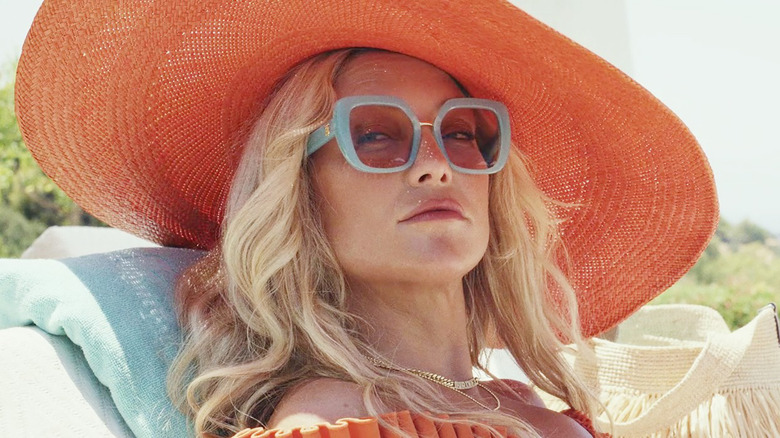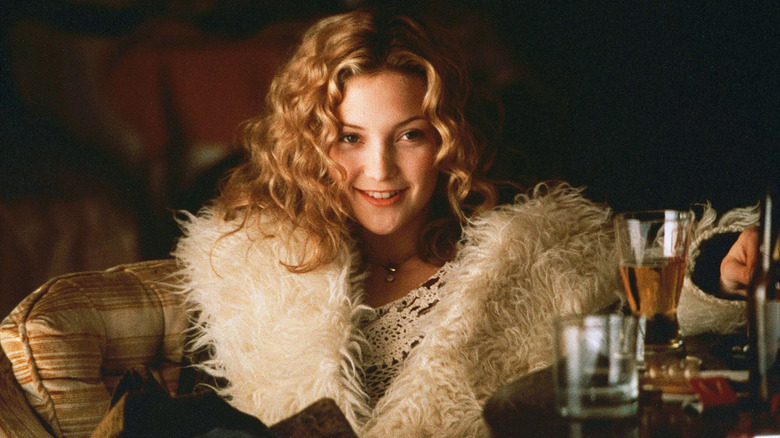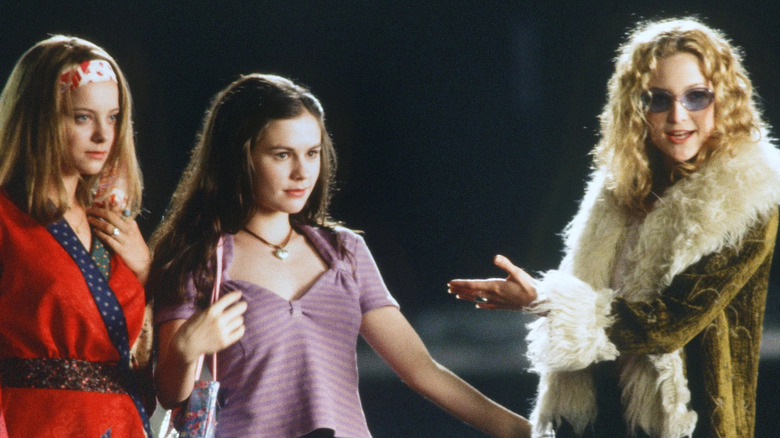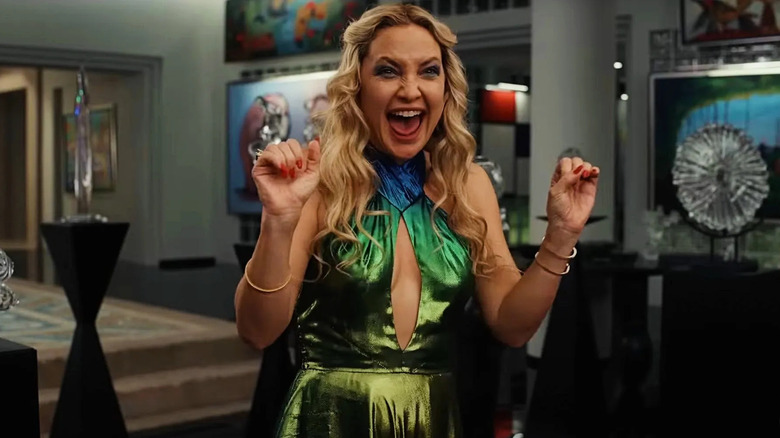Kate Hudson's Glass Onion Character Is The Spiritual Successor To One Of Her Greatest Roles
From the moment we meet Kate Hudson's Birdie in the opening minutes of Rian Johnson's new whodunit "Glass Onion," there is something all too familiar about her. In order to fully explain, I have to circle back to the beginning of Hudson's career, when she was simply a nepo baby who may or may not make it in Hollywood despite being the child of Goldie Hawn. She had only done a couple of films before getting cast as the whimsical groupie goddess Penny Lane in Cameron Crowe's "Almost Famous," and the part quite literally put her on the map.
The film premiered in 2000 after two years of Hudson putting her nose to the grindstone. It couldn't have paid off better. Though still relatively unknown at the time, Hudson garnered a Golden Globe for best supporting actress and even earned an Oscar nom in the same category. The movie has gone on to be a cultural touchstone, so much so that not only has it stayed alive through generational word of mouth, but it is still being reimagined and recontextualized for new audiences. Hell, there's a Broadway production of "Almost Famous" playing right now. But the Cameron Crowe story — despite it being semi-autobiographical — wouldn't be where it is today without Hudson and the magic she brought to the persona of Penny Lane.
Vivacious and slightly spacey
Fast forwarding again to the premiere of "Glass Onion," it was hard not to be immediately struck by the Penny Lane-ness of Hudson's ditzy model part in Rian Johnson's new film. In fact, the two characters could be sisters they're so alike. They both share a childlike, go-getter attitude that they fuse with their own personal strengths to get what they want. Penny Lane was more of a big fish in a small pond, but Birdie Jay was an international sensation, so it goes to show that personality can go a long way. Plus, it's crucial to the foundation of both of Hudson's characters.
Hudson tends to be most successful when she is leaning into this extroverted and confident funny charmer archetype, and you could argue these two roles aren't the only ones where she's flexed this muscle. "How To Lose a Guy in 10 Days," anyone? The point is that both Penny and Birdie, two characters with big dreams and even bigger mouths, need to live within that archetype in order to function successfully in both films. Penny's drive inspires the "Almost Famous" lead, young William Miller (Patrick Fugit). Birdie's previous push to expand her career, despite coming from money anyway, is admired by "Glass Onion" billionaire boy Miles Bron (Edward Norton). Their vivacious, slightly spacey personalities lure people in, and their smarts and intrigue keep them there.
Integrity and values
But like any sister (or, in this case, faux sister) duo, they have their key differences, ones I think ultimately set them far apart from one another despite Hudson's acting choices feeling familiar in both roles. Their morals are, of course, what draws a dividing line between them. In Penny's introductory scene — one that will probably always be remembered for its strength in both Hudson's acting and Crowe's writing — one of the most striking things about her is her impassioned way of speaking and her fierce determination to stay true to her one real love: music (and, as we find out, everything that comes with it).
It's key to meet her this way, because it sets her apart from the stereotypes perpetuated about groupies, and gives her a clean slate to build an impression on. The impression she chooses to present is one of integrity and values. Yeah, she messes up a bit in that area throughout the course of the film, but it's less to do with her convictions and more with the uncontrollable push and pull of love and infatuation.
Where they differ
Birdie, on the other hand, is dubious at best from the start. OK, fine, not entirely from the start, but our introduction to her is filled with the complete opposite sentiment from when we meet Penny. She's totally "bored" at a raucous party when she receives her box of puzzles from Bron at the opening of the film. She's flippant and petulant and spoiled, but with that same Penny Lane-style charm that ties these character personifications together. As "Glass Onion" progresses, we come to find out that Birdie is more than willing to toss integrity and values to the side if it keeps her a seat at the table. Further, she's even willing to completely ruin her reputation to stay comfortable. These aren't decisions I see Penny Lane making. I don't see her backing down from her beliefs or letting her values be determined by a situation that goes against what she knows is right. Access, yes, it's something both characters want. After all, remember the scene where Penny lightly roasts the kid who is touring with Led Zeppelin "but not with them?" The difference is the depths to which they will stoop to get it.
After 20-plus years, it's good to see Hudson circle back to the charms that made her a movie star in the first place. Penny Lane was an on-screen revelation as a character, and it's clear Hudson's work on that role is something that has stayed with her throughout her career. Weaving bits of the iconic part into her later work allows Hudson to do what she does best—wrapping us around her hilarious finger—while exploring new motives that broaden the scope of what she can do. Birdie and Penny probably wouldn't have been friends, but Hudson manages to make them meet in the middle anyway ... with pitch-perfect results.



